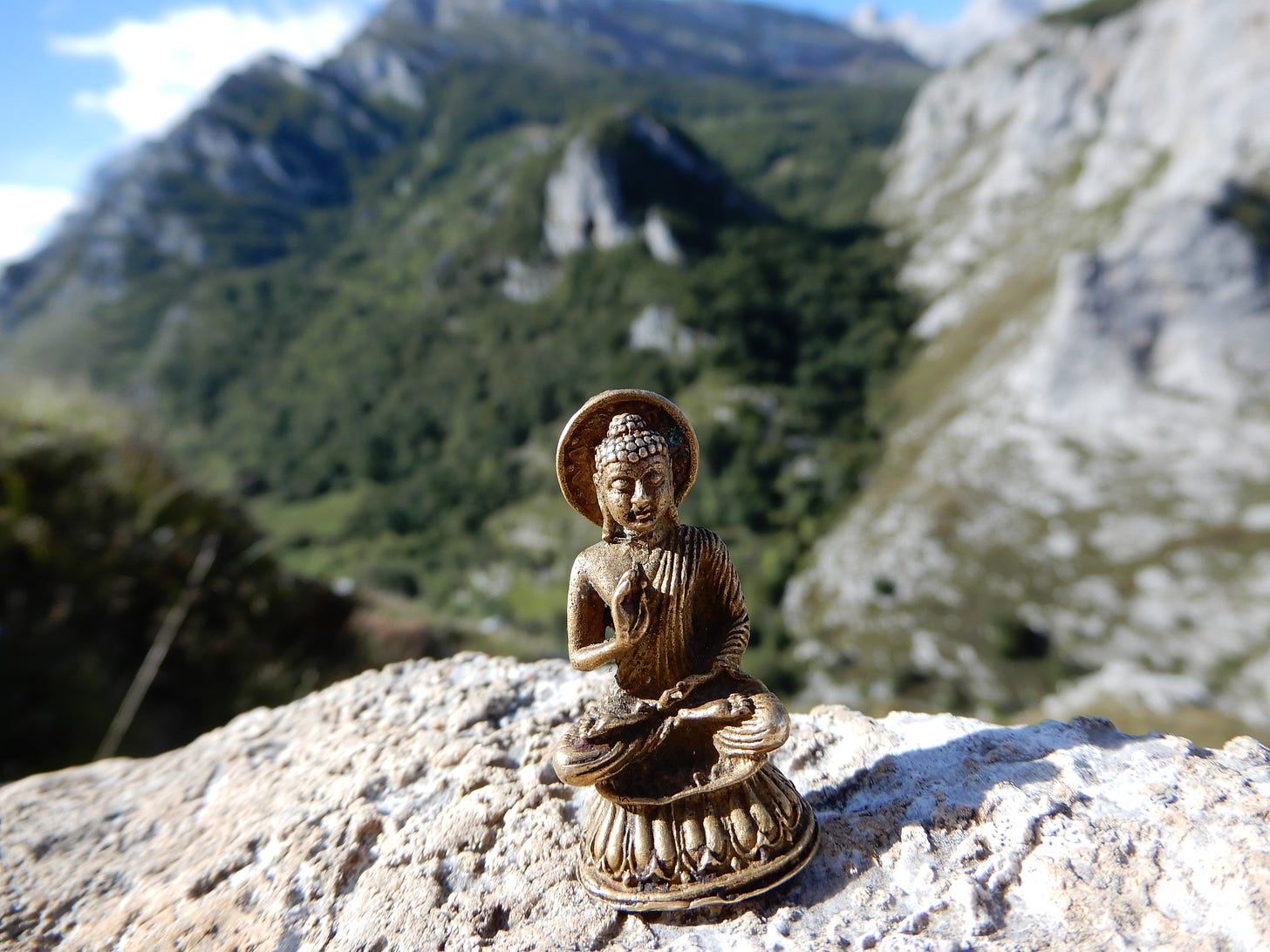
“Body like mountain; breath like wind; mind like sky.” —Tibetan adage
This poetic Tibetan saying has stuck with me since I first read it about five years ago, though I can’t recall where I came across it. It encapsulates the three essential elements of meditation while also being a wonderful reminder that we can learn heaps from nature when we slow down, stop, and pay close attention.
Close enough that we feel the buzz of the bees intoxicating themselves in the folds of flowers. Close enough that the sway of the breeze sifting through the trees stirs our hearts. Close enough that the stare of a stranger sauntering by causes us to smile like a long-lost friend.
The mountains, the wind, the sky—all flow through us and expound the Buddha-Dharma; if we drop below thinking mind, we can FEEL our profound connection with the natural world. We are not surrounded by the environment: It IS us and we ARE it. Not one, not two.
Our modern livelihoods and lifestyles often keep us confined inside small spaces, inside large buildings. Sometimes we don’t even step outside until the sun is setting. And then, we usually hop on the subway or in a car and head home—once again insulated from the vibrant beauty of Mother Nature. This is one of the reasons I quit my 9-to-five life and moved to Tassajara Zen Mountain Center. I was tired of being confined, my body droopy like a tree deprived of sunshine and rain.
Living amid the mountains and waters of the Ventana Wilderness transformed this city mouse into a country monk! The lack of comfort and convenience was often difficult to endure, most especially residing in a rustic cabin with no heat. I was very un-mountain like when I arrived—meaning that I had great difficulty being stable (physically and emotionally) amid all the stressors of monastic life.
However, the continuous practice of zazen, the study of Buddhism, and living with sangha (hey, that’s the Three Jewels!) worked their magic on me; and more and more, over the years, there was less and less resistance. This resistance is the “slightest discrepancy” that causes “the way [to be] as distant as heaven from earth,” as Eihei Dōgen so poetically states in “Fukanzazengi” or “Universal Recommendation for Zazen.”
When the patina of resistance/reactivity wears off, the innate stability of Awareness shines through. This is the “treasure store” that Dōgen says will “open of itself” the more we practice zazen and study the Way—practice-realization. Of course, for most of us, the patina of selfing/resistance/reactivity takes a long time to wear off, and it’s a life-long, moment-by-moment polishing.
Mountains represent our innate capacity to be equanimous in the middle of distress, whether that suffering is internal or external. (Just remember that there’s nothing that exists externally to our perceptual process, but that’s fodder for another post.) Although from far away mountains look like they’re static, solid, and similar, mountains contain whole worlds and are in constant flux, just like our body-minds.
“Mountains’ walking is just like human walking. Accordingly, do not doubt mountains’ walking even though it does not look the same as human walking.” — Eihei Dōgen in “Mountains & Waters Sutra”
Our perception shifts depending on many things and one of these is the vantage point. If we’re in a plane and fly over a mountain range, their peaks are dwarfed from our superior elevation. If we drive by a mountain range, we see more details of the contours and the flora, and if we’re lucky, perhaps an animal or two. The most intimate way to experience a mountain—to discern its walking—is to climb it, hike it, or, if possible, cycle it. A close-up perspective engages all of our senses and alters how we view the mountain and ourselves.

When we “take the backward step” by stilling our bodies like a mountain in meditation, we begin to notice our own walking. We notice the transient nature of our thoughts, pain, suffering, our breath, temperature, sounds, emotions, etc. The closer we pay attention to this ever-changing human being—the compounded phenomena we call “I”—the more the “treasure store” is illuminated, appreciated, and felt.
And, the more often the treasure store opens, the less we attach to whatever is arising and declare ownership of it. That’s true freedom. To be still, stable, and relaxed with the impermanent, impersonal nature of the mountain’s walking.
“[Zazen] is the manifestation of ultimate reality. Traps and snares can never reach it. Once its heart is grasped, you are like a dragon gaining the water, like a tiger taking to the mountains.”—Eihei Dōgen in “Mountains & Waters Sutra”
Stay tuned for the next Sunday Spark where we’ll ride the breath of the wind.



